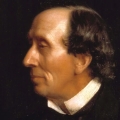
The windmill - Hans Christian Andersen
The windmill
A fairy tale by Hans Christian Andersen
A windmill stood upon the hill, proud to look at, and it was proud too.
"I am not proud at all," it said, "but I am very much enlightened without and within. I have sun and moon for my outward use, and for inward use too; and into the bargain I have stearine candles, train oil and lamps, and tallow candles. I may well say that I'm enlightened. I'm a thinking being, and so well constructed that it's quite delightful. I have a good windpipe in my chest, and I have four wings that are placed outside my head, just beneath my hat. The birds have only two wings, and are obliged to carry them on their backs. I am a Dutchman by birth, that may be seen by my figure– a flying Dutchman. They are considered supernatural beings, I know, and yet I am quite natural. I have a gallery round my chest, and house-room beneath it; that's where my thoughts dwell. My strongest thought, who rules and reigns, is called by others 'The Man in the Mill.' He knows what he wants, and is lord over the meal and the bran; but he has his companion, too, and she calls herself 'Mother.' She is the very heart of me. She does not run about stupidly and awkwardly, for she knows what she wants, she knows what she can do, she's as soft as a zephyr and as strong as a storm; she knows how to begin a thing carefully, and to have her own way. She is my soft temper, and the father is my hard one. They are two, and yet one; they each call the other 'My half.' These two have some little boys, young thoughts, that can grow. The little ones keep everything in order. When, lately, in my wisdom, I let the father and the boys examine my throat and the hole in my chest, to see what was going on there,– for something in me was out of order, and it's well to examine one's self,– the little ones made a tremendous noise. The youngest jumped up into my hat, and shouted so there that it tickled me. The little thoughts may grow– I know that very well; and out in the world thoughts come too, and not only of my kind, for as far as I can see, I cannot discern anything like myself; but the wingless houses, whose throats make no noise, have thoughts too, and these come to my thoughts, and make love to them, as it is called. It's wonderful enough– yes, there are many wonderful things. Something has come over me, or into me,– something has changed in the mill-work. It seems as if the one half, the father, had altered, and had received a better temper and a more affectionate helpmate– so young and good, and yet the same, only more gentle and good through the course of time. What was bitter has passed away, and the whole is much more comfortable." - "The days go on, and the days come nearer and nearer to clearness and to joy; and then a day will come when it will be over with me; but not over altogether. I must be pulled down that I may be built up again; I shall cease, but yet shall live on. To become quite a different being, and yet remain the same! That's difficult for me to understand, however enlightened I may be with sun, moon, stearine, train oil, and tallow. My old wood-work and my old brick-work will rise again from the dust!" - "I will hope that I may keep my old thoughts, the father in the mill, and the mother, great ones and little ones– the family; for I call them all, great and little, the company of thoughts, because I must, and cannot refrain from it." - "And I must also remain 'myself,' with my throat in my chest, my wings on my head, the gallery round my body; else I should not know myself, nor could the others know me, and say, 'There's the mill on the hill, proud to look at, and yet not proud at all.'"
That is what the mill said. Indeed, it said much more, but that is the most important part.
And the days came, and the days went, and yesterday was the last day.
Then the mill caught fire. The flames rose up high, and beat out and in, and bit at the beams and planks, and ate them up. The mill fell, and nothing remained of it but a heap of ashes. The smoke drove across the scene of the conflagration, and the wind carried it away.
Whatever had been alive in the mill remained, and what had been gained by it has nothing to do with this story. The miller's family– one soul, many thoughts, and yet only one– built a new, a splendid mill, which answered its purpose. It was quite like the old one, and people said, "Why, yonder is the mill on the hill, proud to look at!" But this mill was better arranged, more according to the time than the last, so that progress might be made. The old beams had become worm-eaten and spongy– they lay in dust and ashes. The body of the mill did not rise out of the dust as they had believed it would do. They had taken it literally, and all things are not to be taken literally.
* * * * *
Fairy taleHans Christian Andersen
Compare two languages:


















